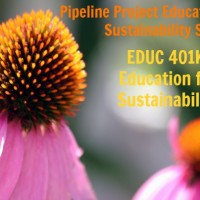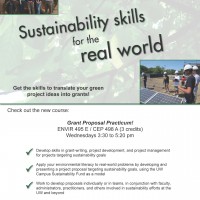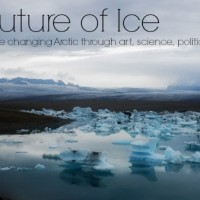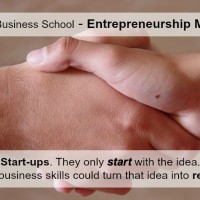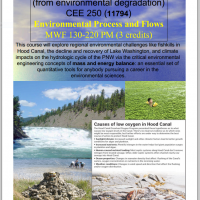Education for sustainability is “learning that links knowledge, inquiry, and action to help students build a healthy future for their communities and the planet.” We will explore the history and opportunity for this field in EDUC401K: Education for Sustainability, a 2-credit seminar through the Pipeline Project. Through volunteer placements in local schools and environmental community organizations, we will analyze the most effective ways for educators to teach the importance of sustainability to the K-12 audience and inspire youth to become active stewards of the earth. The seminar meets Wednesdays 3:00-4:20.
[course] Oil in the Arctic (SPR/2014: SMEA 514)
–check out the following grad level course. Interested PoE students can send an e-mail to the instructors requesting an add code. Recommended seniors, but possibly open to other motivated PoE students. –Joe
+++++++++
Spring 2014
Oil in the Arctic – Decision Making Under Conflict and Uncertainty: Exploring the Environmental and Human Dimensions of Risk from Oil in a Changing Arctic.
SMEA 514 – Marine Pollution Management – Special Theme. This three credit course is open to graduate and advanced undergraduate* students from all schools and colleges. The course meets Arctic Minor elective requirements. Tu/Th 9:30-10:50 (SLN 18905)
The course will examine risks from marine transportation and oil development in the Arctic in the face of changing physical environments, ecosystems, and the human communities that depend upon them. Graduate students from programs across campus will study threats from oil in the context of conflicting values and human-induced changes in the Arctic, with a focus on decision-making affecting the future of the Arctic region and beyond. Understanding these problems in a global context will be enhanced by guest lectures from NGOs, industry, and academia.
The course provides understanding of theory and practice for environmental policy decision-making under conditions of uncertainty, social, and political conflict, in the context of Arctic development. Continuing retreat of Arctic sea ice has opened the continental margin to increasing marine shipping and new oil exploration in an area that could hold 10% of the world’s remaining petroleum. Arctic shipping is increasing with commercial sea routes opening for both cargo and passenger traffic with associated pollution risks. Taught in collaboration with the National Oceanic and Atmospheric Administration, students gain experience in addressing problems in the context of the real world requirements of an ocean management agency.
Offered by the School of Marine and Environmental Affairs through the Future of Ice initiative of the Colleges of the Environment and Arts and Sciences.
* Undergrads will need an add code and must contact either Professor Leschine (tml@uw.edu) or Dr. Pavia (bobpavia@uw.edu) to obtain a code and register for the class.
What makes a sustainable community? How can we instill in younger generations a sense of hope and optimism in a finite world? We will be exploring these questions and more in EDUC 401K: Education for Sustainability, an interactive seminar through the Pipeline Project.
Through participation in a hands-on project in a Seattle K-12 school, students will explore K-12 sustainability education. We will focus on the benefits of experiential, place-based learning for a mindset geared toward future consciousness.
The seminar meets on Wednesdays from 3:30-4:50 pm. All majors are welcome!
For this seminar, the number of credits a student receives depends on the number of service-learning hours completed in addition to seminar attendance. Credit and tutoring requirements are as follows:
2 credits: 2.5 hours tutoring/week (at least 20 hours tutoring/quarter)
3 credits: 5 hours tutoring/week (at least 40 hours tutoring/quarter)
For more information, please visit Pipeline’s website: http://expd.washington.edu/pipeline
This course examines the earth’s past for evidence of extreme climate conditions in order to better understand possible future climate changes. Conditions that occurred during the Neo-Proterozoic (Snowball Earth: 750 to 550 million years ago), the Cretaceous Hothouse (100 million years ago, and Pleistocene Icehouse (1 million years ago) will be compared to the Present Day Greenhouse climate.
Dramatic changes in the earth’s climate has resulted from natural variations in solar insolation, atmospheric concentrations of greenhouse gases, rates of ocean circulation, plate tectonics and volcanic activity, the evolution of vascular plants and, in recent times, the burning of fossil fuels. The impact of these factors on climate, through interactions between the atmosphere, oceans and land, will be discussed.
Importantly, the processes that produced past climate changes will be discussed in the context of modern impending climate change.
One class period per week will be spent in class discussion of an important published scientific paper on Climate. Problem sets, stressing quantitative solutions, will be given as take home assignments during the quarter. Honors students will work in multi-student teams on a project to quantify the CO2 emissions from the City of Seattle. These emissions are responsible for the CO2 ‘dome’ that overlies most large urban areas.
Climatic Extremes
Oceanography 450: Winter Quarter, 2014: SLN 17655
4 credits M, W, Th, F at 11:30 to 12:20
also Honors 221C: SLN 14913 5 credits
Room 205 Ocean Teaching Building
Web address: https://catalyst.uw.edu/workspace/paulj/13956/
Instructors: Paul Johnson (543-8474) Steve Emerson (543-0428)
Teaching Assistant: Megan Gambs (543-8543)
In Winter quarter, six experts on the Earth’s polar regions will present public lectures on the multifaceted ways in which those regions are changing. The speakers include Arctic biologists Jody Deming and Dee Boersma, acclaimed photographers James Balog and Paul Nicklen, Inuit leader Sheila Watt-Cloutier, and former premier of the Yukon Tony Penikett. Each speaker will give an give a public evening lecture as part of the Walker-Ames/Danz lecture series. This class provides an opportunity to meet with the speakers, engage with the material they have presented, and have a conversation about their work. We will meet twice per week during the time of the speakers’ visits, once to read materials prior to the evening lecture, and again to meet with the speaker. Students will be expected to attend all evening lectures and classes, and to submit an essay at the end of the class that brings together the diverse material.
C ENV 490 B / ARCTIC 498 B
2 credits (CR/NC grading)
SLN: 20769 / 21033
T/Th from 10:30AM to 11:20AM
In addition to T/Th class sessions, students must also attend 6 “Future of Ice” evening lectures on various dates (see schedule here). Students who register for the course should NOT register for the speaker series – all students in the course will automatically be registered for the speaker series without having to do so separately
The Business School has just opened UW’s first competitive minor, the Entrepreneurship Minor. The deadline to apply for the winter quarter is October 25th, and another date will be announced in spring for fall admission.
Students who pursue the minor are creative and motivated, and looking for ways to apply the knowledge they’ve gained from their major to an entrepreneurial endeavor. Open to all non-business undergraduates, this 31-credit competitive minor offers students the opportunity to leverage their unique talents, as well as their new-found business knowledge, to achieve their start-up goals.
Prerequisites
- ECON 200 Microeconomics (5)
- ACCTG 215 Financial Accounting (5)
- ACCTG 225 Managerial Accounting (5)
Required Coursework
- ENTRE 370 Intro to Entrepreneurship (4)
- ENTRE 472/473 Creating a Company I & II (8)
- AND choose 4 credits from:
- ENTRE 432 Software Entrepreneurship (4)
- ENTRE 440 Business Plan Practicum (2)
- ENTRE 443 Environmental Innovation Practicum (2)
- ENTRE/MKTG 455 Entrepreneurial Marketing (4)
- ENTRE 459 Venture Investing (4)
- ENTRE 490 Special Topics
The Entrepreneurship Minor will challenge your creativity and critical thinking skills, while providing you with the knowledge and experience every entrepreneur needs.
Apply at: https://catalyst.uw.edu/webq/survey/caz1585/206897
Questions should be directed to Leslie Mabry at the Buerk Center for Entrepreneurship: mabryl@uw.edu, 206-685-5669
[course]: CEP 460: Planning in Context
looking for a last minute addition or change to your autumn quarter schedule? CEP 460 has openings in one of their core courses. Talk to Joe if you are interested in having this course count as a ‘perspectives’ course for your Environmental Studies major.
– Joe (jkob@uw.edu)
[class]: Innovation in Cleantech + Market Opportunity = Solutions for the Planet
Innovation in Cleantech + Market Opportunity = Solutions for the Planet
ENGR 498, ENVIR 495, ENTRE 443/543
- Environmental challenges and opportunities linked to cleantech.
- How to translate an idea into an actual device/product/company
- Market assessment (who would be the customer for this product or service?)
Looking for a class for Autumn Quarter? Check this class out! Looks like it will have a lot of great course content!

